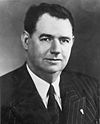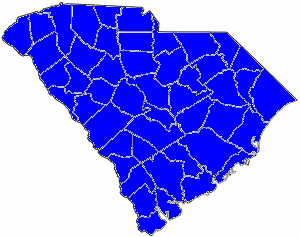
United States Senate election in South Carolina, 1950
Encyclopedia

United States Senate
The United States Senate is the upper house of the bicameral legislature of the United States, and together with the United States House of Representatives comprises the United States Congress. The composition and powers of the Senate are established in Article One of the U.S. Constitution. Each...
from the state of South Carolina
South Carolina
South Carolina is a state in the Deep South of the United States that borders Georgia to the south, North Carolina to the north, and the Atlantic Ocean to the east. Originally part of the Province of Carolina, the Province of South Carolina was one of the 13 colonies that declared independence...
. Incumbent Democratic
Democratic Party (United States)
The Democratic Party is one of two major contemporary political parties in the United States, along with the Republican Party. The party's socially liberal and progressive platform is largely considered center-left in the U.S. political spectrum. The party has the lengthiest record of continuous...
Senator Olin D. Johnston
Olin D. Johnston
Olin DeWitt Talmadge Johnston was a Democratic Party politician from the US state of South Carolina. He served as the 98th Governor of South Carolina, 1935–1939 and 1943–1945, and represented the state in the United States Senate from 1945 until his death in 1965.-Early Life, Military Involvement,...
defeated Strom Thurmond
Strom Thurmond
James Strom Thurmond was an American politician who served as a United States Senator. He also ran for the Presidency of the United States in 1948 as the segregationist States Rights Democratic Party candidate, receiving 2.4% of the popular vote and 39 electoral votes...
in a bitterly contested Democratic primary and was unopposed in the general election.
Democratic primary
Strom Thurmond entered the Democratic primaryPrimary election
A primary election is an election in which party members or voters select candidates for a subsequent election. Primary elections are one means by which a political party nominates candidates for the next general election....
hoping to parlay his momentum from the 1948 presidential campaign
United States presidential election, 1948
The United States presidential election of 1948 is considered by most historians as the greatest election upset in American history. Virtually every prediction indicated that incumbent President Harry S. Truman would be defeated by Republican Thomas E. Dewey. Truman won, overcoming a three-way...
into a victory against incumbent Senator Olin D. Johnston
Olin D. Johnston
Olin DeWitt Talmadge Johnston was a Democratic Party politician from the US state of South Carolina. He served as the 98th Governor of South Carolina, 1935–1939 and 1943–1945, and represented the state in the United States Senate from 1945 until his death in 1965.-Early Life, Military Involvement,...
. The move was highly controversial because Thurmond had promised to never run against Johnston if he pledged his support for his gubernatorial campaign in 1946
South Carolina gubernatorial election, 1950
The 1950 South Carolina gubernatorial election was held on November 7, 1950 to select the governor of the state of South Carolina. James F. Byrnes won the Democratic primary and ran unopposed in the general election becoming the 104th governor of South Carolina.-Democratic primary:The South...
, which Johnston did. The men represented two vastly different segments of the electorate in South Carolina, the textile workers of the Upstate
The Upstate
The Upstate is the region in northwestern South Carolina, United States, also known as The Upcountry, which is the historical term. Although loosely defined among locals, the general definition includes the 10 counties of the commerce-rich I-85 corridor in the northwest corner of South Carolina. ...
supported Johnston and the aristocracy backed Thurmond. The passions both sides felt for their respective candidates led to the race being billed as the "Campaign of the Century."
The campaign began on May 23 in Lexington
Lexington, South Carolina
Lexington is a town in and the county seat of Lexington County, South Carolina, United States. The population was 17,870 at the 2010 census.-Geography:Lexington is located at ....
and Thurmond attacked Johnston for being soft on segregation and too close to the administration of President Truman
Harry S. Truman
Harry S. Truman was the 33rd President of the United States . As President Franklin D. Roosevelt's third vice president and the 34th Vice President of the United States , he succeeded to the presidency on April 12, 1945, when President Roosevelt died less than three months after beginning his...
. At a campaign stop for the Democratic candidates in Newberry
Newberry, South Carolina
Newberry is a city in Newberry County, South Carolina, 43 miles west -northwest of Columbia. The charter was adopted in 1894. In 1890, 3,020 people lived in Newberry, South Carolina; in 1900, 4,607; in 1910, 5,028; and in 1940, 7,510. The population was 10,580 at the 2000 census. It is the county...
on June 26, Thurmond accused Johnston of being "silent as a tomb" when Truman ordered the integration of the military and called out Johnston to stand up and deny it. Johnston stood up and yelled back at Thurmond that he was a liar to which chaos ensued. Thurmond challenged Johnston to a fight and after the meeting as Johnston went to shake Thurmond's hand, Thurmond grabbed Johnston's arm and swung him around. A fight between the two men was only prevented due to the timely intervention of campaign aides and supporters.
Throughout the campaign, Thurmond painted Johnston as a Southern liberal senator similar to Senators Frank Porter Graham
Frank Porter Graham
Frank Porter Graham was a president of the University of North Carolina at Chapel Hill and, for a brief period, United States Senator.-Early life:...
of North Carolina and Claude Pepper
Claude Pepper
Claude Denson Pepper was an American politician of the Democratic Party, and a spokesman for left-liberalism and the elderly. In foreign policy he shifted from pro-Soviet in the 1940s to anti-Communist in the 1950s...
of Florida, both of whom were defeated in their primaries. Johnston responded that he was a key player in a bloc of Southern senators led by Richard Russell of Georgia in defeating civil rights bills. Furthermore, Johnston attacked Thurmond for having appointed T.C. McFall, a black doctor, to the state medical advisory board while Governor of South Carolina. McFall was the fist black appointed to a state position since Reconstruction and Johnston accused Thurmond of making the appointment to capture the black vote. In Charleston at College Park
College Park (Charleston)
College Park is a stadium in Charleston, South Carolina. It was primarily used for baseball and was the home of Charleston RiverDogs. The ballpark has a capacity of 4,000 people and opened in 1939....
, Johnston declared to the crowd that he "would never have appointed the nigger physician of Charleston, Dr. T.C. McFall, to displace your beloved white physician of this community." A chorus of boos rang out from the blacks in attendance and Johnston shouted "Make those niggers keep quiet!"
Thurmond attacked Johnston's record as governor claiming that he had released 3,221 criminals from prison and stated that "it was easier to get out of the penitentiary than it was to get in it." Johnston referred to state statistics that showed he had only pardoned, paroled, or commuted the sentences of 671 criminals. Furthermore, he said that some of the men he had released were named honorary colonels by Thurmond. This charge was given credence because Thurmond refused to make public his list of honorary colonels.
One policy in which the two candidates did disagree on was federal aid to education. While governor, Thurmond had been supportive of assistance from the federal government, but he reversed his position because he feared that the federal government would eventually force integration upon the states. Johnston countered that the state universities received federal funds, but remained segregated and that the state desperately needed assistance because its teachers were grossly underpaid.
The South Carolina Democratic Party
South Carolina Democratic Party
The South Carolina Democratic Party is the South Carolina affiliate of the United States Democratic Party. The Democratic party thrived during the Second Party System between 1832 and the mid-1850s and was one of the causes of the collapse of the Whig Party....
held the primary on July 11 and Johnston emerged as the clear winner. It was estimated that approximately 50,000 blacks voted in the election and they overwhelmingly cast their ballot for Johnston. While the blacks were repulsed by both men's positions on civil rights, they gave their support to Johnston because he had a progressive record and they wanted to penalize Thurmond for his 1948 presidential campaign.
| Democratic Primary | ||
|---|---|---|
| Candidate | Votes | % |
General election results
| colspan=5 |DemocraticDemocratic Party (United States)
The Democratic Party is one of two major contemporary political parties in the United States, along with the Republican Party. The party's socially liberal and progressive platform is largely considered center-left in the U.S. political spectrum. The party has the lengthiest record of continuous...
hold
|-

See also
- List of United States Senators from South Carolina
- United States Senate elections, 1950
- United States House of Representatives elections in South Carolina, 1950United States House of Representatives elections in South Carolina, 1950The 1950 South Carolina United States House of Representatives elections were held on November 7, 1950 to select six Representatives for two-year terms from the state of South Carolina. Four incumbents were re-elected, but Hugo S. Sims, Jr. of the 2nd congressional district and James Butler Hare...
- South Carolina gubernatorial election, 1950South Carolina gubernatorial election, 1950The 1950 South Carolina gubernatorial election was held on November 7, 1950 to select the governor of the state of South Carolina. James F. Byrnes won the Democratic primary and ran unopposed in the general election becoming the 104th governor of South Carolina.-Democratic primary:The South...

